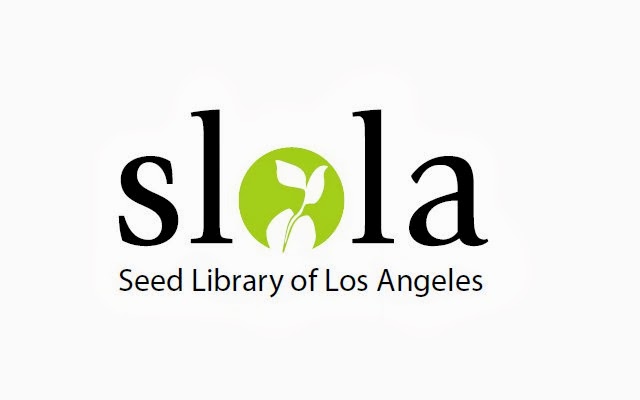Saving Seed is a Sacred Trust
and I know why SLOLA has cards with that on it.
Those of us who started the Seed Library of Los Angeles looked at the diminishing diversity of the seeds we were growing and were shocked at the disappearance of diversity in many different food families. This chart from National Geographic gives us an idea of the loss of diversity in the past century. There are many ways this chart could be better documented, but this is probably the least amount of lost diversity - we need another, more authoritative, study to base our work on.
The dwindling resources available to the common gardener were not impressive. We could order seeds from Seed Savers Exchange, Southern Exposure Seed Exchange, some seeds from Pinetree Seeds, and Baker Creek had just begun to splash large on the seed saving world. The true catalytic event happened in Summer of 2009.
I'm going to tell the story in truth, including that I knew too little about seed saving and started the seed library with a wrong idea. However mistaken I might have been, it served as the impetus for an email to everyone I thought might be interested to meet at The Learning Garden on December 4th.
Sometime in the waning days of Summer that year (2009), the Obama administration approved production of more GMOs - including sugar beets. I knew just enough to be dangerous. Beets are wind pollinated. Their pollen is released into the air from male flowers and must find female flowers in order to make seed. If it has to be airborne, it is light-weight and will travel far (our experience with corn has made us leery of the reported distance pollen can travel). I was already growing some beets for seed and I thought my seed was at risk for getting crossed with GMO sugar beets. Admittedly, I knew even then that the chances were low that any farm near me was growing sugar beets, but it was theoretically possible and I was already quite angry about GMO this and that.
I was wrong in that, farmers growing sugar beets as a commodity crop, were NOT going to allow their crop to get to the pollen stage - they were being harvested long before that time (beets are biennial, meaning they grow their roots the first year and in the second year produce pollen and go to seed). But still, ignorant as I might have been, a fire had been lit and I put in motion the beginnings of this adventure. Those people who showed up at that first meeting were the founders of the seed library and their wisdom and influence is still felt in our attention to our mission.
We are not the Free Seed Society of Los Angeles - it doesn't even come of the tongue as nicely as SLOLA. And it's not our purpose. Our goal is not to give away free seed. Our goal - read the Mission Statement - is to create seed saving gardeners. And why do we want seed saving gardeners? We want them, need them, to protect our wonderful resource of all these amazing edible plants and we - gardeners! - are the ones entrusted with this task! We are the ones who can do it and therefore we are the ones who must do it!
It is a sacred trust. Indigenous peoples have a stunning appreciation for the sacred in these seeds. We wish to cultivate that appreciation in ourselves and our society. We frown upon the hybridization of so many of our precious plants - hybridization equals corporate ownership - and it's my sense that they only care about money, not hungry people. So we choose those seeds that are not hybrid, from which we can save seeds and reasonably expect the seeds to grow the same crop year after year.
But "sacred" means so much more than that. One definition reads, "regarded with great respect and reverence by a particular religion, group, or individual." We wish to follow in the footsteps of those who regard their food and the land they grow it on, with "great respect" knowing that it is these seeds and that land that allows us our lives. There is nothing more important to a civilization than this and water.
We tend our plants, our seeds, with respect and honor for them and those who came before that saved this seed and passed them down to us. They are not patented (how can you possibly condone patenting life?) and they are not tampered with at the molecular level. We are joyful to give seeds so people can grow at least a part of their diet, but we are much more concerned with keeping these varieties of vegetables alive for future generations. Next time you check out seeds at SLOLA, choose one type of seed that doesn't need cross pollination to produce viable seeds - in summer, that includes most tomatoes, beans of types and lettuces. Just choose one and plant more than you'll need. Save seeds from the best plants and when it's dry, return it to your SLOLA branch. You'll be amazed how easy it can be and feel the reward of a job well done.
You will have been the curator of your own batch of seeds. You don't have to save seeds from all the seeds you check out, but start with the selfing types of seed (those I noted above) and you'll be so proud of your little seed empire!
And remember, there are experienced seed savers who are happy to help you do the right thing! We ALL had to learn and, what's more true, we are still all learning!
david

